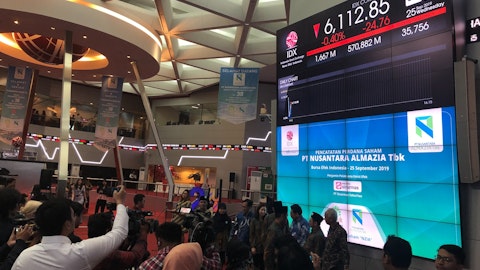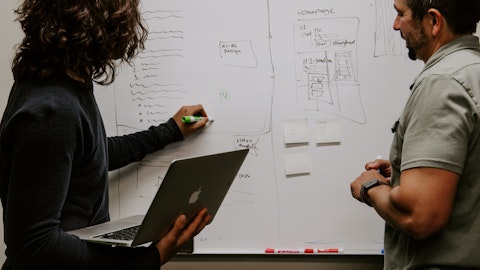Francisco Valim: Matthew, what we have been seeing is we are working on cost reductions all across the board. We have already implemented the bulk of the headcount reduction in September, but we are still seeing opportunities for improvement in that area. Also we have been optimizing processes so that we can be more efficient in working with different providers to reduce cost. So it is not something that was a one shot. This is something that we have been very diligently trying to find better opportunities to decrease our cost. In terms of the impact we have had from Hurricane Otis, we have a significant, an important portion of the revenues. We basically, we stopped billing clients for October, November, December of last year.
So there was the revenue has been impacted negatively because of that. So we were able to compensate that with other efforts and cost efforts. As we revamp the network and reintegrate customers into the network, we should see a lot of that recovery. And so in terms of the impact, the impact is fully accounted for already in the fourth quarter. Most of the impact from approval was already reported on the fourth quarter. So we should be seeing some improvement moving forward regarding that. The question regarding if it has been the rebuilding has been paid, operational income, I’ll turn to Carlos because he will explain that.
Carlos Phillips Margain: Yes, I think and correct me if I’m wrong, but I think your question is regarding the other income and expense line in our income statement. And year-over-year as we have mentioned before the main factors have been the severance expenses at IZZI given the reduction that Valim has carried out and the damages caused by Hurricane Otis. But as you observed there has been some offsetting income as well. Part of it has to do with interest income from our recovery of tax assets that we had. And in particular in this quarter there’s a non-recurring income that has to do with the liquidation of certain of our subsidiary. This is really just an accounting factor and we’ve been doing some efficiencies in the corporate end in terms of reducing our subsidiaries and clean up and that’s non-recurring income that also helped during the quarter, offsetting some of the losses from the Hurricane Otis costs.
Unidentified Analyst: Okay. That makes sense. Thank you very much.
Operator: The next question comes from Carlos Legarreta with ITAU. Please go ahead.
Carlos de Legarreta: Good morning, gentlemen. My question is regarding TelevisaUnivision. As you know, during the quarter, the company renewed carriage deal with one of the leading U.S. Cable company. So I was wondering if you can please elaborate on the size of the opportunity with Charter and if there are any other pending deals like this either in the U.S. or Mexico? Thank you.
Alfonso de Angoitia Noriega: Thank you, Carlos. I think it’s a great question and it allows me to expand on our new deal with Charter. We feel really good about the partnership that we have with Charter. I think it’s reflective of where the paid television ecosystem is likely to head over time. For the pay TV ecosystem to stabilize and grow, consumers need to see a better value proposition and that will only happen through innovation and that’s what our new partnership is all about. It’s innovation in the product, innovation in the interface, platform, availability, packaging, pricing et cetera. Charter is pushing this forward and our new partnership enables this offering on a number of these fronts that I described. First, the re-bundling of streaming packages with the basic linear package, this is essential to this new deal.
This obviously improves the value proposition for customers, but only to the extent that the content in the streaming service is not redundant to the content in the linear package. And I would say that the second example is us providing our linear services as a cornerstone of Charter’s upcoming launch of a lower price Spanish only OTT product. The new packaging and pricing creates a valuable choice for price and platform sensitive customers. So this is really important. This is a big change and this is a new product, lower priced product, which we believe will be very successful. And lastly, it’s important to mention that this renewal with Charter happened earlier, which is unique in this environment of tension between programmers and distributors.
So we’re very happy about having been able to close the deal and the new extended partnership with Charter. This is a clear recognition of the uniqueness and value of our service and the ways we can work together with a company of the size and scope of Charter as partners to build their business. So we’re very happy about this new and extended partnership.
Carlos de Legarreta: Thank you, Alfonso.
Operator: This concludes our question-and-answer session. I would like to turn the conference back over to Mr. Alfonso de Angoitia for any closing remarks.
Alfonso de Angoitia Noriega: Thank you very much for participating in our call and we’re always ready to answer any questions you might have. If you have them, please give me a call. Enjoy the weekend. Thanks.
Operator: The conference is now concluded. Thank you for attending today’s presentation. You may now disconnect.
Follow Grupo Televisa Sa (NYSE:TV)
Follow Grupo Televisa Sa (NYSE:TV)
Receive real-time insider trading and news alerts




